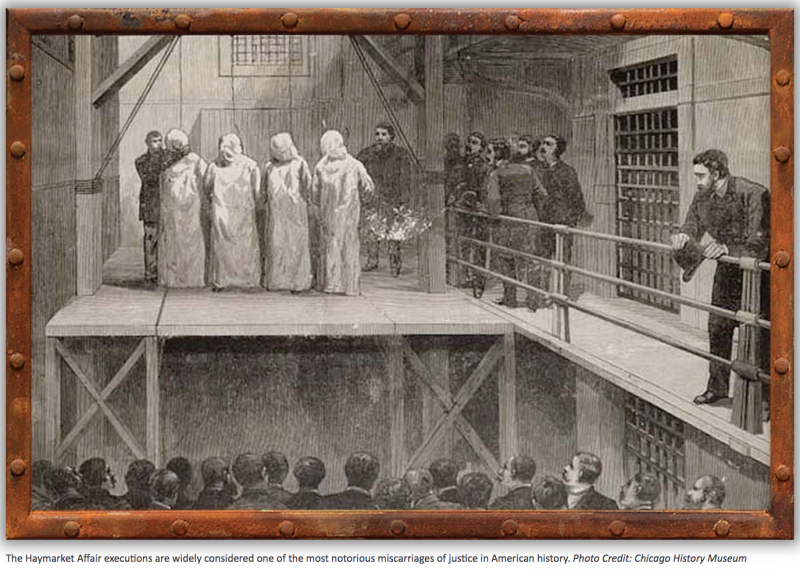May 1st is International Workers' Day!
How a peaceful labour protest ended with bloodshed and became an international flashpoint for workers’ rights
Apr 30, 2021
A story that started with peaceful protest and ended with bloodshed.

Did you know that May 1st is a public holiday in several countries (India, Bangladesh, Cuba, China, and Germany to name but a few) many of which refer to it as Labour Day or International Workers’ Day?
For centuries throughout the Northern Hemisphere, May Day had been a traditional day of celebrating the arrival of spring. With seeding mostly completed, farmers would often give their workers the day off and towns and villages throughout Europe would hold festive gatherings.
How May 1st came to be celebrated as International Workers’ Day is a story that started with a peaceful protest that ended with bloodshed.
At the 1884 convention of the Federation of Organized Trades and Labor Unions in the United States, delegates set May 1, 1886 to demand an eight-hour workday. As the day approached, unions prepared for a general strike to force employers to bow to this demand. Hundreds of thousands of workers struck on May 1 across the United States.
In Chicago, a hotbed of trade unionism, tens of thousands of workers hit the streets, joining others already on strike or locked out. Among the latter were workers at the McCormick Harvesting Machine Company plant. By the time of the general strike, there were already several hundred police officers stationed outside the plant to keep the peace between picketers and replacement workers. Until May 3, despite all of the labour unrest, there was no violence.
After a rally on May 3, a group of striking workers surged toward the plant gates to harass the replacement workers coming off their shift. The police fired into the crowd and two workers were killed.
The next evening, people gathered at Haymarket Square to protest police violence and reiterate demands for an eight-hour workday. After several speeches and after most people had gone home, police descended on the rally around 10:30 pm. As police marched towards the workers, someone threw a homemade bomb in their path. It exploded, killing at least one officer immediately. Police opened fire and, while it is unknown if anyone fired back, seven policemen and at least four workers died. One police official, speaking anonymously, told the Chicago Tribune that it was most likely the police killed each other.
What followed was a huge clamp down on union activity. Eight men, most of whom were not even present when the violence broke out, were arrested and charged with murder. After a farce of a trial, all eight were found guilty. The judge sentenced seven of them to hang and the eighth to 15 years in prison, triggering protests around the world.
Read more about the Haymarket Eight here.
While what happened was a temporary setback for the labour movement’s fight for the eight-hour day, they didn’t give up.
In 1888, the American Federation of Labor (AFL) convention decided they would call for a general strike on May 1, 1890. The AFL’s president wrote to the Congress of the Second International (a coalition of socialist and labour parties from around the globe), which was meeting in Paris. In response, the Congress adopted a resolution calling for an international demonstration of workers on May 1, 1890 in solidarity with American workers.
The first International Workers’ Day was a resounding success, with workers demonstrating around the globe for an eight-hour workday. On many of their minds were those workers gunned down at Haymarket for doing the same.
In Canada and the United States, Labour Day is celebrated on the first Monday of September. Both federal governments adopted the day in an attempt to prevent the more radically-focused May Day celebrations from taking hold.
And so, in addition to Labour Day, many workers in North America also celebrate May Day as an important day to commemorate the fight for workers’ rights. We remember people actually died fighting for rights that we tend to take for granted today. And we commit to fight to keep them! Solidarity!
If you are interested in finding out more about the Haymarket affair, check out this free documentary screening and webinar on May 1st at 6:00 P.M. MST.
Click here to watch the film at your convenience (available from 12 noon EST April 28 to Midnight EST May 2).
Register for the webinar here.
HAYMARKET: The Bomb, The Anarchists, The Labor Struggle is presented by the DC Labor FilmFest, Workers Unite! Film Fest, the Rochester Labor Film Series, the Bread and Roses Heritage Committee, the Haifa International Labor Film Festival, and the Labour in Motion Movie Club as part of the 2021 Global Labor Film Festival.
News Category
- Member update

